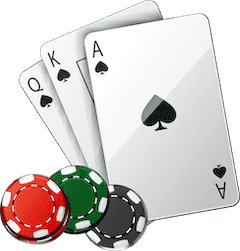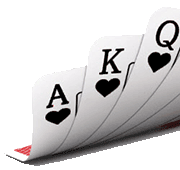Free Omaha Poker Strategy 2024
What is Omaha Poker?
Although Omaha Poker is similar to the popular Texas Hold’em variant, Omaha Poker is a complicated Poker variant. Mainly because a player’s final poker hand is limited to comprising two hole or pocket cards and three community cards. Many of the Omaha variations lie in the Turn and River betting rounds. We will introduce you to the best strategy Omaha Poker. Read about the course of an online Omaha Poker game and start using the Poker strategy to win big.
Omaha Poker vs Texas Hold’em Poker
Omaha Poker, also called “Omaha High Poker” or “Omaha Hold’em Poker”, is played very similarly to the well-known Texas Hold’em Poker, only with several slight variations. The overall experience, however, is exceptionally different. Investigate the Texas Holdem Poker strategy, and compare them to this Omaha Poker guide – to identify the differences between the two poker variations. Check also the different free deposit poker bonuses.
CONTENT:
Lots of Poker variations can be played in almost any online casino. Check out the free deposit bonus for these popular casinos – GoldenStar Casino and Loki casino – and find different poker strategies and poker tricks here at slotsinspector.com.
Poker Guide Overview of Online Omaha Poker
1. As in all online poker games, the “button” symbol represents the hand’s theoretical dealer and moves in a clockwise direction.
2. The small poker blind and big blind post their poker bets precisely as in Texas Hold’em, yet players are then dealt four hole/pocket cards, face down, instead of the regular 2. Then the pre-flop betting round begins, in which all bets and raises are limited to the minimum bet.
3. Three community cards or board cards are placed in the centre of the table, known as the flop, and are shared by all players. The flop round of betting takes place, and again all bets and raises must reach the minimum bet.
4. A 4th community card is added to the table, and the Turn betting round begins. From here onwards, the betting is limited to the maximum bet.
5. The dealer then turns over a 5th card, the “River”, and a final betting round occurs.
6. Now, players must reveal their hands in the Showdown, where Omaha differs significantly from other Poker variations, like Video Poker and Crazy Pineapple Poker.
In Omaha Poker, a player’s final hand must comprise 2 initial 4 holes/pocket cards and 3 community cards dealt during the betting rounds. If there was no bet in the final round, the last bettor or raiser shows his/her cards first, and other players follow clockwise. The player with the winning 5 card combination will be awarded the pot, and if two or more players have equal hand rankings, the pot is divided equally among them.
Some specific characteristics of Omaha Poker online;
• Just like in Texas Hold’em, three or more suited cards make a flush, yet in Omaha Poker, 2 of these cards must be hole/pocket cards.
• 2 pairs on the board do not make a full house for anyone with a matching card.
• A player must have a pair in their hand and three of a kind on the board to make a full house.
“Omaha vs. Texas Hold’em: Elevate your poker play with Omaha’s four-hole cards, adding depth and challenge beyond Texas Hold’em’s two-card strategy.”
How to play Omaha Poker
Omaha Poker rules
Omaha Poker is an evolution of Texas Hold’em, and as such, the game shares the same betting structure, rules, objectives, and terminology. This page will, therefore, introduce you to the game of Omaha by explaining the differences between them, the possible variations of Omaha, and how the game unfolds with these changes.
Omaha Poker is mostly an evolution of Texas Hold’em. The rules are very similar and only differ where small aspects of the game do. For this reason, this guide shall focus on the game rules specific to Omaha Poker, and for all other rules applying to the game, one should visit the Texas Hold’em rules page.
The most obvious and defining characteristic of Omaha Poker is the dealing of 4 hole/pocket cards to each player in the Pre-flop round of betting. What is interesting, however, is that players are still required to use only 2 of their hole cards – and 3 of the community cards to make their hands, as they would in Texas Holde’m. There are 5 community cards dealt throughout the betting rounds, and they are all dealt face-up. In each game of Omaha, there can be no more than ten players.

The Pre-flop round-hole cards are dealt to each player, starting with the small blind.
The Flop – 3 of the 5 community cards are laid in the middle of the table by the dealer.
The Turn – a 4th community card is dealt face-up on the table.
The River a 5th community card is dealt face up for all players.
The Showdown – all remaining players must reveal their final hands so that the winner can be determined and the pot awarded.
Omaha Poker can be played using three betting limits, precisely as in Texas Hold’em;
1. Limit Omaha Poker– a predetermined betting limit is set.
2. No-Limit Omaha Poker – players can bet all their chips at any point in the game.
3. Pot-Limit Omaha Poker – PLO Poker rules – players can bet no more than the pot amount.
The live PLO strategy will be different from the basic version. Omaha Poker can also be played in a High Low variation. In Omaha Poker High Low, the pot is split between the highest and lowest hand. The high hand is determined according to standard poker hand rankings, and the low hand is determined according to low hand rankings specific to this kind of Poker. The highest card in a low hand must not exceed an 8, and straights and flushes do not apply. Accordingly, the best possible low hand is A-2-3-4-5. Because of the limitation on cards to not exceed 8, the game is also sometimes called “8 or Better”.
Read more about Omaha high-low poker online
“Master the strategic complexity of using exactly two of your four hole cards in combination with three community cards to craft your winning hand.”
Omaha Poker Strategy in basics – How do you play Omaha Poker and win?
The card game, Omaha Poker, is very similar to Texas Hold’em. However, the required strategy is very different. What may be considered a good hand in Texas Hold’em will probably not work in the long run in Omaha Poker, and it is, therefore, wiser to use an Omaha specific approach when playing. Use these guidelines as a way to determine the right decisions and succeed more in the long run.
Omaha Poker is same time also played very similarly to Texas Hold’em, and therefore many people use the same poker strategy for both games. While they are indeed alike, it is essential to take advantage of the unique aspects of the Omaha poker games, which make gameplay not only smarter but also more successful in the long term. The following will overview the best tips for Omaha’s strategy, which should bring you more success at the tables.
Omaha Poker hands
Omaha Poker Starting Hands
As in Texas Hold’em, the most important decisions you will make will be based on your starting hand. Although you receive four cards and have a better chance of receiving something valuable, remember that so do all the other players, so you will have to be very selective.
The best starting hands in Omaha Poker have two high ranking pairs (best suited) and a good high draw (Ace to high flush). Respectable hands have four double suited cards in a row that are higher than 6, a 6-7-8-9, a 10-J-Q-K, or one pair of Aces or Kings.
Weaker hands can have low pairs, Ace with low suited cards, or any two cards to a straight. Starting hands that can most definitely be discarded include quads (including A-A-A-A) and trips (except for A-A-A with a high card suited).
Omaha should be played aggressively with straights, flushes, and full houses.
The Flop – Having 4-hole cards, most players will usually continue to see the flop. As a result, positional raises will not work, so don’t use them at a late position, for example. The most basic strategy at this point is to fold all hands that do not have two pairs or nuts. Or something close to these hands, such as a king-high flush.
The Turn – If you hit a straight or flush, you should bet strongly – do not give out free cards to other players.
The River – Unlike Hold’em, in Omaha poker, it is common to have the ultimate nuts after the River. If you do and you think you are ahead, bet strongly. If you don’t then check, yet you shouldn’t give your opponent a chance to draw out on you if you can help it – the probability of completing your flush after the River is over 20%.
Note: To calculate the probability of completing your hand with only one card remaining, simply multiply the number of outs by 2. If you have two cards remaining, multiply the outs by 4.
“Remember, Omaha’s complexity is in its multiple potential hands; play wisely to manage the risks and opportunities each hand presents.”
How to get the most out of Omaha Poker Online
Everything you ever needed to know about re-draws in Omaha poker includes strategies and tips for tackling opponents, sitting on a re-draw and playing nut hands. The most common problem for experienced Texas Hold’em players is that they try to treat Omaha as four card variation of the original game. The following tips should help remind you that the two games require some different types of thinking!
Useful online Omaha Poker Tips;
Poker tip 1: Omaha is filled with draws
• Remember that Omaha involves multiple draws
• It is predominately played as a pot limit
• Remember that you draw to the nuts
• Be wary of seeking the king-high flush as this could well be disastrous if you reach it
• Remember to think about your opponents’ hands before deciding whether or not to flop a good hand
Poker tip 2: Be wary of Nut hands
• Players may often have identical nut hands, but one player may have the chance for an extra draw
• If two players go all-in on this flop, one player may risk losing all while another risks nothing
• Example:
• The flop is Kh – Qs –Ts
• The player holding A-J-x-x is, therefore, holding the Broadway straight
• A player with two spades has the chance to redraw to a flush
• A player with A-J-Q-Q or even A-K-J-T can redraw to a full house.
• This means that the second player has an opportunity to win the full pot while the first player risks all
Poker tip 3: Dealing with no re-draws
• If there are no re-draws and lots of action you have several options
• The chips will ultimately arrive at the middle of the table if the stacks are small
• If the stacks are bigger, you need to try to manipulate the size of the pot – particularly on the actual flop
• If you have no opportunity for a re-draw, you might even wish to consider a fold rather than going all-in if the stacks are particularly high.
• Example:
• You have a late position, and you flop the Broadway straight
• The player before you bets
• If you choose to raise, the other player might re-raise
• You might have to fold or risk everything
• Therefore it might be better to call only and see how the hand progresses
• This means that you are controlling the pot size
• If you don’t have redraws, it might be more advantageous to go all-in on the turn because there is a small chance of getting outdrawn.
Poker tip 4: Getting the most out of sitting on a re-draw
• If you are sitting on a re-draw, you will be aiming to win as much as possible from players who have also flopped
• Slow playing the hand means that you are in danger of your opponent folding should your redraw hit
• You will also be against other hands that are not yet complete
• The key thing is to strike a balance between remembering that this is a game of draws and playing nuts assertively.
Playing Omaha, the Omaha way
Read a simple strategy for Omaha Hold’em, full of recommended starting hands and advice. Omaha Poker is a much more flexible variation that Texas Hold’em, in that it allows players to choose their best hand out of several possibilities. Such choices, however, do impose on them a different approach when it comes to strategy, so we will try to overview some fundamental aspects of Omaha strategy for you here.
Omaha Poker rules and strategy
Before we begin, let it be known that in offline and online poker, the “nut” or “nuts” refers to the strongest hand possible in a given situation. In Omaha poker, the nut hand is usually anything below a straight flush or quads (which are pure winners), and it is vital that a player aims for the nut hand at all times. Let us explain why;
When a player is dealt with 4-hole cards and must use 2 of them to complete a 5-card hand with the community cards on the table, there are always six possible ways of choosing those two cards. This means that when you are in a game against four people or more, there are at least 24 different hole-card combinations (usually more) so that by the time you make it to the River, there is a more than likely chance that your two cards will be beaten by a better combination. Even a pair or trips can easily be beaten when there are so many possible combinations, and it is for this reason that it is so worthwhile pursuing only the nut hands – the ones that will guarantee (or close to it) that you will not be beaten.
As such, we recommend you play the following starting hands (in order from best):
– A high pair (king – 10)
– A suited Ace and high card
– Two high suited cards
– Two middle pairs (6-9)
– Two high cards (Ace-10)
– Ace and a middle card
– Two suited consecutive middle cards
“In Omaha Poker, the real art lies in mastering the complex interplay of multi-card combinations and strategic foresight.”
Omaha Poker – Simple and Traditional Poker
Slots-Inspector’s Poker guide provides full rules for Omaha Poker and a game overview for all those interested in learning this traditional variation. Omaha is a traditional poker variation, yet the recent boom in Texas Hold’em has caused many to abandon what was once the most popular game. Why not go back to old poker roots and learn this fun and competitive variation?!
Omaha Poker is quite similar to Texas Hold’em. The main difference between them is that in Omaha the board cannot be used on its own as a hand. In Europe, the high hand is usually the winner, whereas, in America, the High Low split is generally played. Whatever your fancy, the game goes as follows:
1. Omaha is played with blinds, so before the hole cards are dealt the small and big blinds are placed by the two players left-most of the dealer.
2. The dealer then deals a hole 4 cards face down to each player.
3. The player placed to the left of the big blind must call it, raise it, or fold his/her hand. Betting continues until it reaches the small blind.
4. In the “Flop” round, the dealer turns up 3 community cards in the centre of the table. In Omaha, each player is required to build a 5-card hand using 2 of the hole cards and 3 of the community cards. This is the last round in which there are forced bets.
5. A round of betting follows.
6. In the “Turn”, a fourth community card is dealt face-up on the table, and another round of betting takes place. Betting is now limited to a higher stake.
7. In the “River”, the final up-card is laid on the table by the dealer, and the remaining players must reveal their hands. The best hand according to standard hand rankings, wins the pot.
Free Omaha Poker Games online
Where to play Omaha poker online free of deposits?
Free Omaha poker is still to be found online. However, it is crucial to know how to find real and fair games without any hidden demands. Poker Omaha online free – more to come. Visit our updated list of NO DEPOSIT POKER BONUS
Before playing, learn for free Omaha poker strategy. You find everything you need here on Slotsinspector.com.
Which are Omaha hands to avoid?
Playing Omaha Poker successfully requires not just knowing which hands to play but also understanding which hands to avoid. Here are some hands you should generally avoid when playing Omaha Poker:
- Four of a Kind: Although four of a kind may seem like a strong hand, in Omaha Poker it’s not particularly useful. Having four of the same card means you have fewer opportunities to make strong combinations with the community cards.
- Three of a Kind: Similar to the four of a kind, having three of the same cards severely limits your options for making strong combinations.
- Two Pairs: Having two pairs in your starting hand is not as good in Omaha Poker as it is in Texas Hold’em. This is because you can only use two of your hole cards in Omaha. Having two pairs leaves you with fewer options to make strong hands.
- Low Suited Cards: While having suited cards can be beneficial as it increases your chance of making a flush, if your suited cards are low, it’s usually not a good starting hand. This is because even if you do manage to make a flush, if someone else also has a flush, yours will likely be lower.
- Disconnected low cards: Having four low cards that are disconnected, for example, 2-4-6-8 of different suits, is generally a weak hand. Such a hand has little potential for making a strong combination.
- Unsuited and Unconnected: If your four starting cards are all unsuited and unconnected, it’s usually not a strong hand. This is because the potential for making a strong combination, such as a flush or a straight, is limited.



